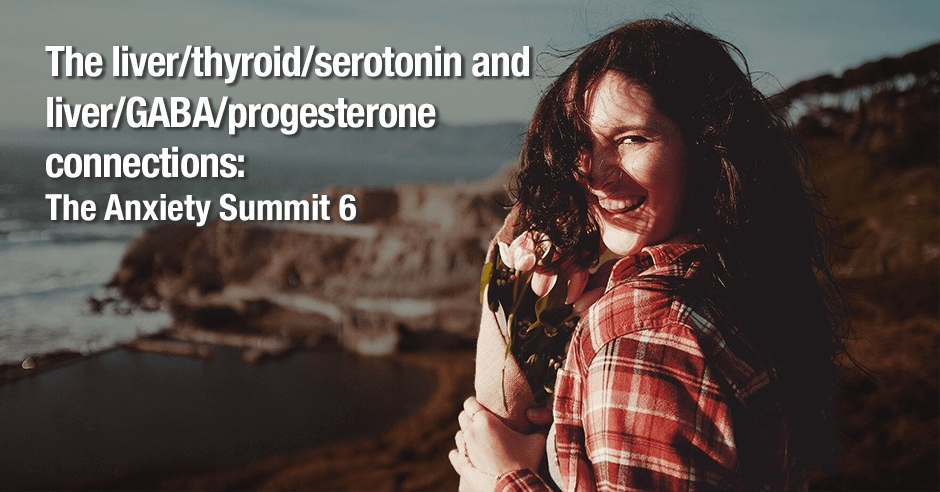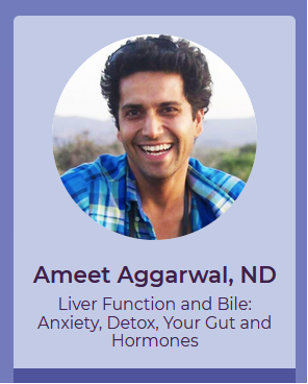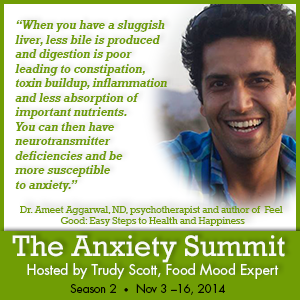Dr. Ameet Aggarwal is one of my guest experts on The Anxiety Summit 6: Toxins/Meds/Infections!
and our topic is Liver Function and Bile: Anxiety, Detox, the Gut and Hormones. Here is some of what we cover in our interview:
- The liver/anxiety connections: thyroid/serotonin, microbiome and GABA/progesterone
- Foods and nutrients like NAC, triphala, turmeric, taurine and lycopodium
- Gilbert’s syndrome and schizophrenia; misophonia; family constellations therapy; giving and endorphins
and much more.
We discuss a number of the mechanisms as to why poor liver function affects your mood. There is the liver/thyroid/serotonin connection, and the liver/GABA/progesterone connection.
In the discussion on the liver/thyroid/serotonin connection and anxiety, Dr. Ameet shares from this paper – The Relationship between the thyroid gland and the liver (paraphrased as I don’t yet have transcripts):
- Thyroxine and tri‐iodothyronine are essential for normal organ growth, development and function
- These hormones regulate the basal metabolic rate of all cells, including hepatocytes, and thereby modulate hepatic [liver] function
- The liver in turn metabolizes the thyroid hormones and regulates their systemic endocrine effects.
- Thyroid dysfunction may perturb liver function
- Liver disease modulates thyroid hormone metabolism.
The catecholamine and thyroid interrelationship is well recognized but less is known about the serotonin and the thyroid. Dr. Ameet shares the synergy between the thyroid hormones, serotonin and mood:
- animal studies shows that the thyroid economy has a modulating impact on the brain serotonin system
- studies in hypothyroid patients have shown that thyroid replacement therapy improves serotonin production
In summary, if we have compromised liver function and/or low thyroid function this may impact serotonin levels and lead to increased anxiety.
Here is a snippet from our discussion on the liver/GABA/progesterone and anxiety:
- We often think about mental health as being neurotransmitters alone but it also depends on hormones. Progesterone affects how GABA works in the brain.
- GABA is your anti-anxiety neurotransmitter but it requires progesterone to work well in your brain and your liver metabolizes all your hormones through phase 1 and phase 2 detoxification
- If your liver is compromised then you’re likely to have lower progesterone levels and estrogen dominance.
- With low progesterone GABA won’t work as well as well in the brain, leading to anxiety and insomnia.
Again, if we have compromised liver function this may impact progesterone levels, having an effect on how GABA works and causing increased anxiety.
If you recall, I shared this GABA/progesterone snippet a few weeks ago before the site was ready and now it’s ready for you to register.
This interview is one of the registration gifts so you can listen to it right away as soon as you register (there will also be a complimentary transcript made available as soon as it’s completed.)
Here is a little about the summit… as you know, anxiety can be related to your daily life experiences BUT it can also be triggered by:
- foods you eat and what you drink (like wheat, oxalates, alcohol and more)
- environmental toxins (like lead, plastics, fragrances, insecticides, fluoride and more)
- many types of medications (like the birth control pill, acne medication, fluoroquinolone antibiotics and more) and/or
- chronic infections (like Lyme disease, PANDAS, parasites, candida and more).
Once you identify the root causes and understand anxiety’s mechanisms you can support the liver/gallbladder, detox, address infections, implement targeted and supportive solutions, and get relief!
WHY ATTEND?
This is my 6th Anxiety Summit, featuring all new topics and the latest research related to anxiety and toxins, medications and infections.
I’ve also experienced many of these health challenges myself – lead and mercury toxicity, gluten issues and candida – and I’m currently dealing with chronic Lyme disease and dietary oxalate issues. You’ll hear some of my healing journey and my solutions in a few interviews too.
WHAT SETS THIS ONLINE EVENT APART?
What sets this apart from other events on toxins and infections is being able to make the many connections to GABA (the main calming neurotransmitter) and serotonin (a happy and calming neurotransmitter) AND how to use the amino acids GABA and tryptophan to ease your anxiety right away while you are dealing with the other underlying root causes – which take longer to address.
You will see this woven into each of the expert interviews (just like this one with Dr. Schaffner) and also addressed in detail in my 3 interviews where I do a deep dive into specific applications.
For example, in my toxins interview, I share how GABA reverses fluoride-induced anxiety and hypothyroidism, and how tryptophan and vitamin C ease anxiety symptoms associated with lead toxicity (I’ll be sharing more about this in the future so stay tuned….)
Over the course of the next 6 weeks you’ll be seeing frequent emails from me with snippets and highlights from various interviews – like this one. I do hope you continue to enjoy them and get excited about the summit! Please do share if you know someone who has anxiety!
It’s been wonderful to get all the emails saying how excited you are and seeing so many of you signing up. These last few months have been full-time on research and interviews and I’ll shortly get to share it all with you!
You’ve heard me say the Anxiety Summit has been called “a bouquet of hope!” My wish for you is that this summit is your bouquet of hope!
I hope you’ll join me and these incredible speakers, be enlightened and find YOUR solutions!
Here’s to no more anxiety and you feeling on top of the world again!
If you’re already familiar with some of this information and practice some of this already please share how it’s helped you. That way we can all learn.
If you’d like to ask a question, please post in the comments below.
I’d also love to hear from you once you’ve listened to this interview. Please do come back and comment about some of the highlights of this interview and what changes you plan to make.




